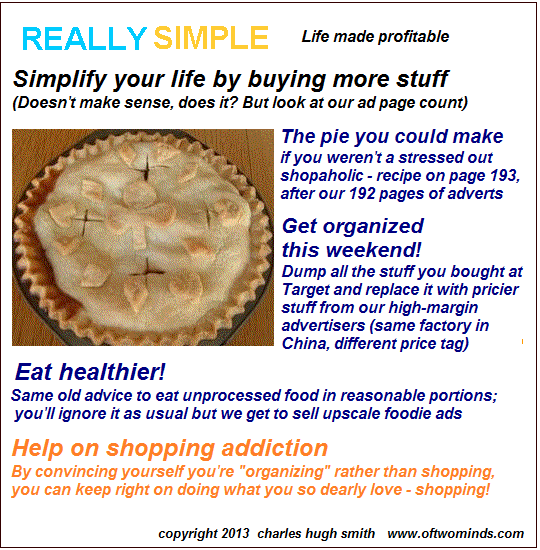Simplicity requires eliminating virtually everything we are "processed" to want and need for personhood, and accepting the intrinsic complexity of meaningful projects.
The two are not mutually exclusive, of course, but one does not necessarily lead to the other. For example, an unemployed single person who cashes a check from the government and eats fast food has a very simple life. One fellow I knew with this simple life rented a room in a rooming house and spent his time watching films and hanging out with his pals. Life couldn't get much simpler than that.
Did he control his life? Yes, but we would be hard-pressed to declare his adolescent lifestyle positive. To the degree he was dependent and aimless, it could be argued that his control was superficial, since his life was not directed toward any meaningful goals or purpose. He had the same level of control over his life as a teenager on summer break.
We lose control when we become trapped. Being heavily in debt is being trapped; being burdened by too much stuff or too many commitments is also being trapped.
Does the shopaholic debt-serf feel in control? They do when they're shopping--that's part of its appeal. It's the consequences of debt and over-spending that the shopaholic has little control over.
Studies have found that the most stressful occupations are those in which the employee has very little control over the workplace. So changing one's life to extend meaningful control over the consequences of one's choices reduces one primary source of stress.
Increasing one's range of action, i.e. stop being trapped, is one way to increase control over one's life.
A meaningful life is rarely simple. Many hold up a monastic life as simple and meaningful, but even a monastery is a complex enterprise. Someone has to manage the workflow, maintain the buildings and gardens, settle minor disputes, handle donations and so on.
Everything I espouse here is intrinsically complex. Being self-employed, preparing real food, growing your own vegetables and fruit if at all possible, building your own house--each project is time-consuming and requires experience and multiple skills.
It is far easier to drive to a fast-food outlet and get a prepared meal for a few dollars than it is to pull some beets from the ground, clean them, and prepare the leaves and the beets separately. It is much easier to buy a meal at a restaurant than it is to nurture a patch of dirt. (Gardening requires stewardship of the soil--a large topic in itself.)
It's a lot easier to buy a peach than to tend a peach tree. I just spent hours plucking off surplus fruit from our tree--a necessary pruning when hundreds of fruit threaten to overload the tree and produce an abundance of small fruit.
Being self-employed or running a small business requires wearing multiple hats at all times, and being devoted to one's clients and customers regardless of one's state of mind or energy level. To survive, self-employed/entrepreneurs must pursue continual learning. Being self-employed is an endless triage--what won't get done today?
It's quite simple to pursue a life of sloth and torpor, a path of self-destruction honeyed by the appealing aimlessness of permanent adolescence. It is difficult to keep fit, and it also requires self-knowledge, learning and experience.
A meaningful life directed at purposeful goals is inherently complicated. Everything of value takes time, focus, energy and a willingness to adapt and learn. Taking the kids out for a bike ride is a lot more complicated than turning on the TV: the bikes have to be maintained, the kids' helmets have to be securely fastened, and the adult has to be vigilant at all times, scanning for potential dangers and offering guidance without being so heavy-handed that the ride loses its fun.
Is this a simple activity? Only from the outside.
The key point here is the goals can be few and simple, even as the tasks are complicated and contingent. Though we can't simplify inherently complex projects, we can strip away self-destructive pursuits and habits, and simplify the goals we are pursuing.
Since we live in a culture dominated by marketing and double-binds, we often say we're pursuing a goal but our actions and choices run counter to our stated purpose. People claim they want to pursue self-cultivation, for example, but then they indebt themselves so heavily that they do nothing but commute and work a job they dislike:
Why People Hate Their Jobs (James Altucher)(via Kenneth D.)
"Someone on quora asked me: why do people hate their jobs? I answered: Note, not everyone hates their jobs. There are some “entre-ployees” out there that love their jobs. But for the other 98% of the population..."
Here is a typical advert for packaged food, which I have adjusted with truthiness:
There are many small things we can do to simplify those mechanics of life that can be simplified: have one credit card instead of seven, for example. Cook a stew or pot of chili that will last a few days so we don't have to cook every night. Stop watching network and cable TV, with their incessant marketing of insecurity and self-destruction. Devote some time to being disconnected and allow your mind to wander, for example, taking a walk without a phone, iPod, etc. Before you start your day, ask if the day's activities serve your short list of goals and your chosen path.
Simplicity isn't necessarily simple to achieve. It requires eliminating virtually everything we are "processed" to want and need for personhood, and accepting the intrinsic complexity of meaningful projects.
Special "the end of the world as we know it" sale on seeds from our longtime supplier Everlasting Seeds:TEOTWAWKI SALE! 20% OFF!
In light of the calamitous predictions regarding the Global Coastal Event [Clif High], Korean Nuclear tensions, and Solar/EMPs “Kill Shot” {Ed Dames}, we thought we'd offer folks the largest discount we've ever given. We're not 'fortune tellers' here, or Seers, or 'Intuitives': but if even ONE of these predictions come to pass, it'll definitely make for a 'bad hair day' {week/month/year...} for all of us...
Things are falling apart--that is obvious. But why are they falling apart? The reasons are complex and global. Our economy and society have structural problems that cannot be solved by adding debt to debt. We are becoming poorer, not just from financial over-reach, but from fundamental forces that are not easy to identify or understand. We will cover the five core reasons why things are falling apart:
 1. Debt and financialization
1. Debt and financialization
2. Crony capitalism and the elimination of accountability
3. Diminishing returns
4. Centralization
5. Technological, financial and demographic changes in our economyComplex systems weakened by diminishing returns collapse under their own weight and are replaced by systems that are simpler, faster and affordable. If we cling to the old ways, our system will disintegrate. If we want sustainable prosperity rather than collapse, we must embrace a new model that is Decentralized, Adaptive, Transparent and Accountable (DATA).
We are not powerless. Not accepting responsibility and being powerless are two sides of the same coin: once we accept responsibility, we become powerful.
Kindle edition: $9.95 print edition: $24 on Amazon.com
To receive a 20% discount on the print edition: $19.20 (retail $24), follow the link, open a Createspace account and enter discount code SJRGPLAB. (This is the only way I can offer a discount.)
| Thank you, James M. ($20), for yet another wondrously generous contribution to this site -- I am greatly honored by your steadfast support and readership. | | Thank you, Jason D. ($25), for your much-appreciated generous contribution to this site -- I am greatly honored by your support and readership. |



 1. Debt and financialization
1. Debt and financialization


























